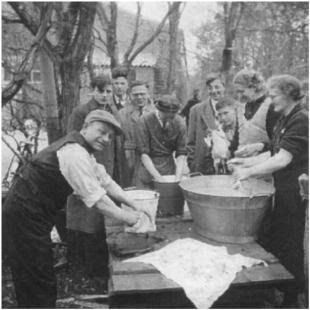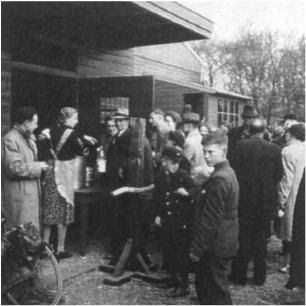In Ede, the Germans found themselves under remarkably accurate fire from the Dutch guns. This fire was so accurate that the German commander suspected that information was being passed to the Dutch artillery by people in Ede. So on Sunday, 12 May, Whit Sunday, he ordered the civilian population to leave Ede. He justified this move with: “Soon everything will be destroyed”.
The exodus of thousands of Ede residents soon began. On foot and pushing items such as bicycles, prams and hard-carts laden with possessions, they headed for De Driesprong and then moved on further to Otterlo and Wekerom. On the way, some of them already found a suitable spot in the woods to await further developments. Others were offered shelter by private individuals.
More than 1000 people ended up at De Valouwe estate, owned by Mr J.W. Schlimmer. He provided a large riding hall for the Ede citizens, who included many elderly, sick and disabled persons. The floor of the hall was covered with a thick layer of straw to make things a little more comfortable for the night. Moreover, local farmers cooked chickens to prepare soup for the refugees.
It was soon announced that people were being allowed to return to Ede – but not everyone felt it was safe to do so. The Mayor of Ede, Mr L.R. Middelberg, then came to De Valouwe in person and told the people, on behalf of the German commander, that there was no longer any danger. After a while, everyone returned to Ede. On 15 May, the Dutch army capitulated and the German occupation began, which was to last five years.
Do you want to experience this story on its original location? Visit this information panel at the intersection Edeseweg/Wekeromseweg and Immenweg.

